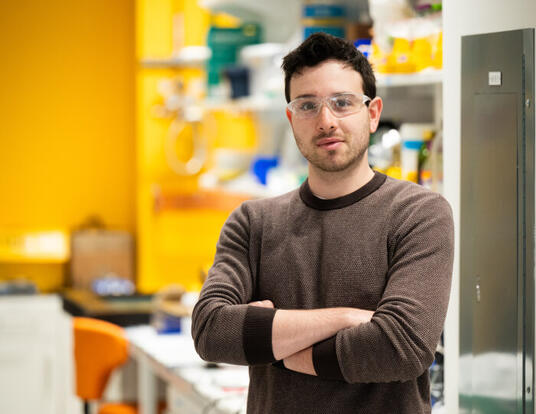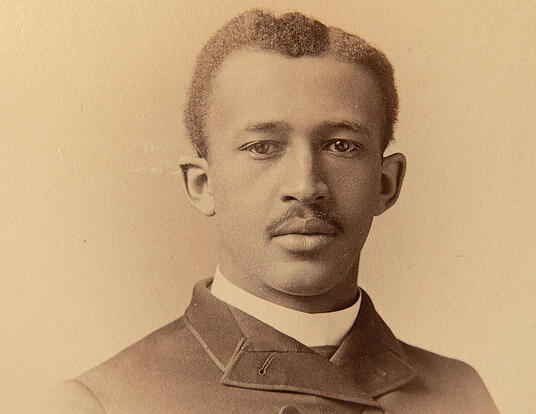Brain Barriers and Breaking Barriers
Neuroscientist Ya’el Courtney’s journey from poverty to PhD
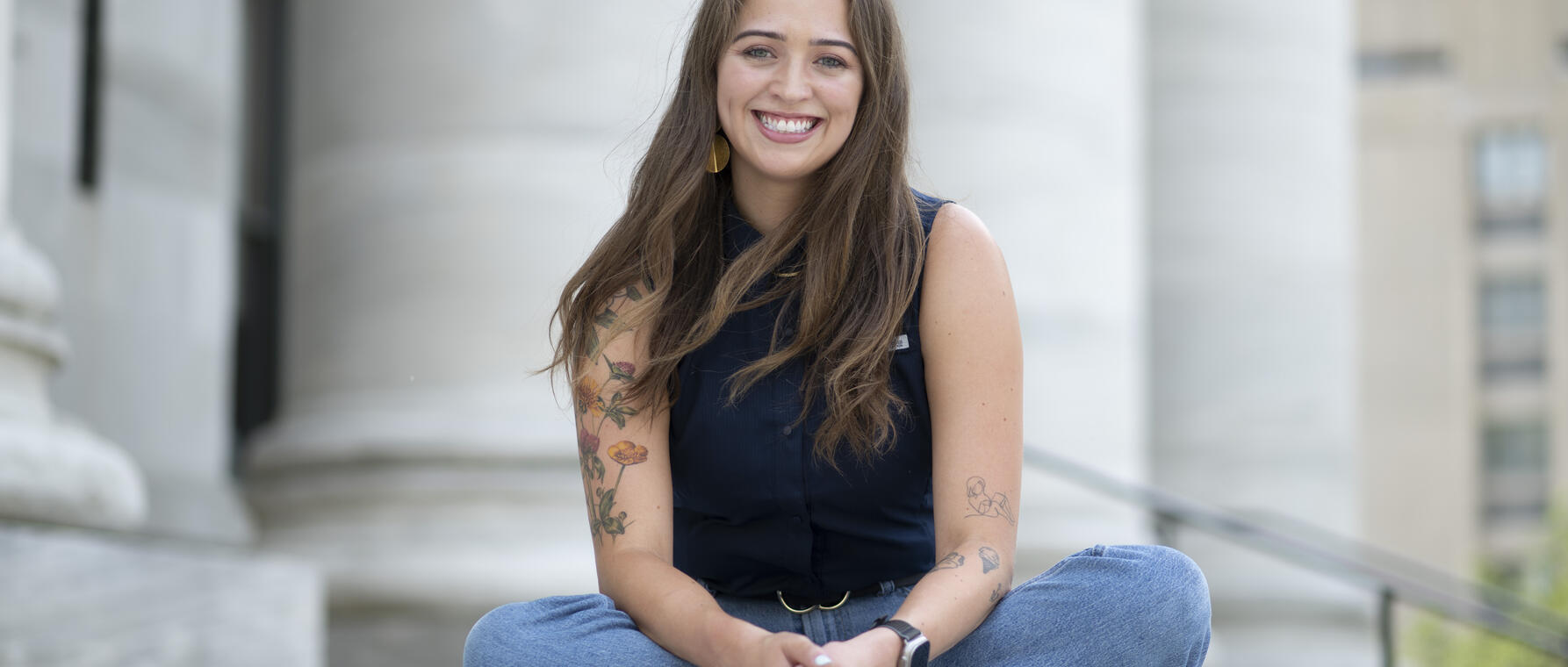
Research at Risk: Since World War II, universities have worked with the federal government to create an innovation ecosystem that has yielded life-changing progress. Now much of that work may be halted as funding is withdrawn. Find out more about the threats to medical, engineering, and scientific research, as well as how Harvard is fighting to preserve this work—and the University's core values.
When Ya’el Courtney was seventeen, she was working as a manager at a Wendy’s in Northeast Ohio, averaging sixty-five hours a week. With no parents to call, no car, and no health insurance, she spent her sparse free time at the public library, devouring book after book in an attempt to answer one question: What do I want to do with my life?
“I decided that I was going to hone my life passions by reading,” she recalled in an interview with the Harvard Brain Science Initiative (HBSI). “I’d head to the library every week or two and wander around the nonfiction section, taking home any book that sparked my interest. I ended up reading 300 books that year.”
In January 2025, Ya’el Courtney graduated with a PhD in neurobiology from the Harvard Kenneth C. Griffin Graduate School of Arts and Sciences. Her journey to this moment is as remarkable as the science that brought her here.
A Path Forged Through Adversity
Courtney left a difficult foster care situation at the age of fifteen. Her early independence came with serious challenges. "My grand entrance into the independent adult world was made without money, without health insurance, without a car, without parents to go home to on the holidays or call in tough times," she wrote in the essay, “Burgers, Bartending and Benchwork: My Journey to Graduate School.” “Those were a really hard couple of years.”
Yet amid that instability, she found purpose. One book in particular, The Brain That Changes Itself by Norman Doidge, introduced her to the concept of neuroplasticity and inspired a new goal: a PhD in neuroscience. She began reading primary scientific literature and found that the people behind those discoveries were PhD researchers. She decided that was what she wanted to be.
My grand entrance into the independent adult world was made without money, without health insurance, without a car, without parents to go home to on the holidays or call in tough times.
—Ya'el Courtney
Earning her GED was the first step. Despite lacking financial support, she eventually enrolled in college, double majoring in biochemistry and psychology at Kent State University. To make ends meet, she worked long shifts at the fast-food restaurant chain, Wendy’s, and later as a bartender, while volunteering in a research lab and carrying a full course load. “My freshman year of college, I averaged 3 hours and 43 minutes of sleep a night because I was trying to manage it all without compromising anything,” she wrote. Her commitment came at a cost: serious illness caused by exhaustion and a lack of health care access. But she persevered.
She also grew into a mentor. "I do this on a volunteer basis with several organizations that serve underprivileged groups in an effort to demystify academia and make it more accessible to all," she wrote on the HBSI website of helping students with applications and essays. That commitment to widening access would continue throughout her graduate studies.
Discovering a Hidden Tissue
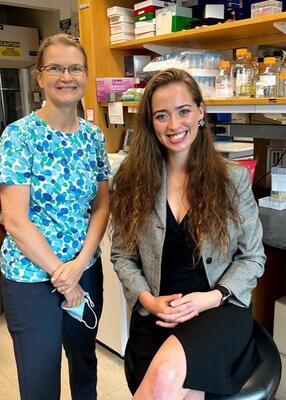
Courtney arrived at Harvard in 2019 and joined the laboratory of Professor Maria Lehtinen at Boston Children’s Hospital, where she found a research focus that matched her intellectual drive and her fascination with underexplored biological systems. She studies the choroid plexus, a little-known tissue suspended in the brain's ventricles that produces cerebrospinal fluid (CSF) and acts as a critical barrier between the brain and the blood.
“I study a super cool little tissue that most people haven’t heard of—at least I hadn’t until my senior year of college!” she said in the HBSI interview. “I am specifically excited about the mechanisms by which the choroid plexus modulates cerebrospinal fluid contents, and the biological importance of this modulation.”
Her research explores how the epithelial cells of the choroid plexus secrete molecular signals into the CSF—signals that are critical for brain development. Working with mice, Courtney builds on Lehtinen’s discovery that CSF isn’t just a cushion for the brain, but a communication channel. One of her key studies focuses on how activating certain serotonin receptors during pregnancy can disrupt this signaling, with consequences for fetal brain development.
When I expose pregnant mice to a drug that activates the serotonin receptor, I see an imbalance of neurons in their offspring. I also see different social behaviors. It’s unclear whether this is anxiety or if exposed mice are simply less interested in company, but they are not engaging in standard social behavior.
—Ya'el Courtney
“When I expose pregnant mice to a drug that activates the serotonin receptor, I see an imbalance of neurons in their offspring,” she explained in a 2024 Harvard Griffin GSAS profile. “I also see different social behaviors. It’s unclear whether this is anxiety or if exposed mice are simply less interested in company, but they are not engaging in standard social behavior.”
This has real-world implications. Some psychiatric and epilepsy medications, as well as psychedelics under investigation for mental health treatments, activate the same serotonin receptor. Courtney's work raises critical questions about their safety during pregnancy and has opened new avenues for understanding how maternal health and brain development are connected.
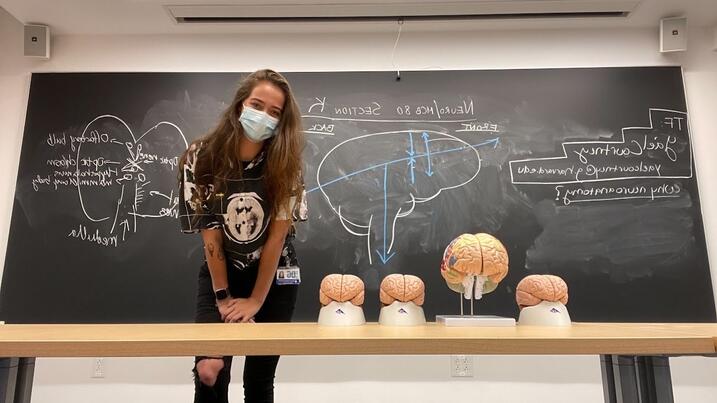
A Voice for Reproductive Research and Equity
Courtney is an advocate for reproductive health research, noting that for many years, female animals were excluded from scientific studies. That oversight, she argues, has serious consequences.
“Ten years is not a long time in science,” she said of the 2016 NIH policy requiring female mice in research. “That means a lot of the drugs out there today had their first tests in exclusively male mice.”
Her work aims to correct that imbalance. She credits Lehtinen for fostering a research environment where these questions are not only encouraged but prioritized. “She was an incredible mentor and she studied embryonic brain development,” Courtney said. “That was what drew me in.”
In her own mentorship roles, Courtney continues to prioritize inclusivity. She has taught multiple undergraduate courses at Harvard College, including Neurobiology of Behavior, Foundations of Neuroscience, and Cellular Basis of Neuronal Function. She has also volunteered with organizations that support students from underrepresented backgrounds in science.
In 2021, she was named a Howard Hughes Medical Institute Gilliam Fellow, an honor that recognizes both scientific excellence and leadership in diversity, equity, and inclusion. “It is given to around 50 individuals a year across the country who must display not only cutting edge scientific research, but true dedication to leadership,” she wrote.
Turning Points and Triumphs
Courtney’s journey to Harvard was not without last-minute obstacles. Before starting her PhD, she was faced with the high cost of moving to Boston. “I had to pay a lump sum including first month’s rent, last month’s rent, security deposit, and a broker fee,” she wrote. A roommate loaned her the necessary funds. “I ended up continuing my work as a bartender and picking up a summer job in a research lab until three days before I made the move to Boston so that I could pull together that money.”
Today, reflecting on how far she’s come, Courtney says: “I am one of the happiest, most content people I know. Life is really unbelievably good for me right now, but it took a lot to get here.”
Looking Ahead
Now a postdoctoral scholar in immunology and rheumatology in the Department of Medicine at Stanford University, Courtney focuses on uncovering the mechanisms underlying post-acute sequelae following viral and bacterial infection—basically, why some people stay sick or feel unwell long after they've recovered from an infection. (Long COVID, is a well-known example.) Her long-term goal is to run her own academic research group while serving as a public advocate for science.
I am one of the happiest, most content people I know. Life is really unbelievably good for me right now, but it took a lot to get here.
—Ya'el Courtney
“I am exceedingly passionate about serving as a communication liaison between scientists, the public, and lawmakers,” she wrote in her Harvard web bio.
Her path—from public library bookshelves to cutting-edge neuroscience labs—demonstrates the power of determination, mentorship, and a relentless pursuit of understanding. And while the choroid plexus may be a hidden tissue, thanks to Ya’el Courtney, it is helping to illuminate the future of brain science.
Draft copy for this article was generated by GPT 4.0, engineered, edited, and augmented by Paul Massari.
Get the Latest Updates
Join Our Newsletter
Subscribe to Colloquy Podcast
Simplecast



